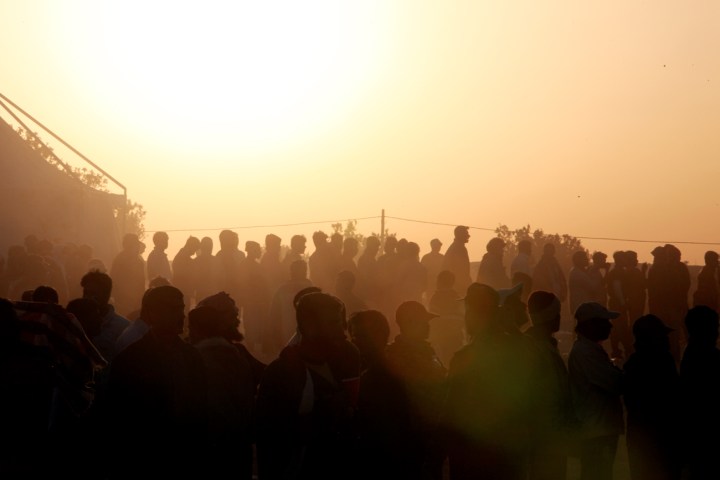Africa, Maverick Life, South Africa
Human trafficking: South Africa gets a little wake-up call

It’s always been something that happens elsewhere, like North Africa, the Middle East or Asia. But we’ve always had our own unique problems, which has driven the need for legislation like the Prevention and Combating of Trafficking in Persons Bill which has languished in Parliament for the last five years. But last week something happened that might speed things up a little. By MANDY DE WAAL.
Human trafficking doesn’t often make the headlines in South Africa, but this week was an exception because the Limpopo police made a massive bust during which 47 Ethiopians were saved after being kidnapped for ransom from the Musina refugee centre in Limpopo.
South African Police Services spokesman Brigadier Hangwani Mulaudzi tells Daily Maverick that the police were first alerted to the situation when a relative of those held reported that 10 family members were being held and that R2,000 was being demanded for each. Mulaudzi says that if the ransom for those held wasn’t paid, the plan was to sell the Ethiopian nationals into slavery.
“These people come in as asylum seekers, but there was money involved in this case and that is how we managed to grab the kidnappers.” Six alleged kidnappers were apprehended. Five of them were Ethiopians. Mulaudzi said police weren’t sure of the nationality of the other person, but thought he could be Indian.
“Taking into consideration the number of people getting into our country, one would think that there is a lot of trafficking happening. This case gave us a wake-up call. We need to take this matter very seriously now,” says Mulaudzi.
South Africa should have had a comprehensive law to protect human rights in terms of human trafficking, but the Prevention and Combating of Trafficking in Persons Bill that is sitting with the justice portfolio committee in Parliament has yet to be passed. The law was supposed to come into effect in April, but the latest indication from committee chairman Luwellyn Landers is that it will be signed into law in May.
The bill, which has been in Parliament for the past five years, is specifically aimed at stopping or at least preventing human trafficking through the imposition of harsh sentences, the prosecution of people involved in the chain of human trafficking, and more importantly seeks to aid and protect those people who are kidnapped.
Mulaudzi says he doesn’t have statistics for how often human trafficking happens in Limpopo, but says people are brought in and forced into hard labour. “Most of these people come from Pakistan or Somalia and are made to work in spaza shops.”
The 47 Ethiopians who were rescued were all mature and are being taken back to the Musina refugee camp for processing, after questioning by police. Mulaudzi says the people appear to have been held without being properly fed, and were weak and malnourished when police freed them.
“When we got them they were not in a good condition. We had to make sure at the police station that they got the nourishment they needed. I would hope that by now they will have gotten a couple of decent meals. They were only being fed bread and water by the kidnappers,” says Limpopo’s police spokesperson.
The kidnappers have appeared in court, were refused bail and will appear again on 14 May. Mulaudzi says it’s the first time a case like this has occurred in the area, but DA Limpopo spokesman Langa Bodlani says information he has on hand shows that the “selling of people for slavery purposes is rife in Limpopo because of the proximity to the border”.
“We will be asking our colleagues in the National Assembly to establish a national task team between home affairs, foreign affairs and defence to determine if we have officials colluding with international crime syndicates. The people arrested are mostly foreign and the people who were kidnapped were Ethiopian, which means this is likely the work of an international syndicate,” says Bodlani. “Someone is bringing these people in.”
Bodlani said it was disturbing that such a gross human rights violation was happening in South Africa in this day and age. “It is an affront to the people of Limpopo who are known to be hospitable and who value the inherent dignity of human beings. If it goes unabated it may affect our image as a tourist destination.”
The DA intends picketing the courts to protest that human rights should be afforded to all, including foreign nationals. “We want to express our condemnation against slavery, which is against our Constitution and declared a crime against humanity by the international community. It goes against what we are trying to achieve as a country,” he said.
Human trafficking is rife across Africa. Anti-Slavery International says thousands of young girls in Niger are sold for between R3,000 and R6,000 in Nigeria and are forced into unpaid labour and made to wear heavy brass rings around their ankles to signify that they are owned – that they are slaves. Women are frequently forced to have sex without their consent once they near puberty.
Estimating accurate statistics for the global human trafficking is problematic, but the UN’s Global Initiative to Fight Human Trafficking estimates profits to be in the region of $31.6-billion, with about 5% or $1.6-billion of this coming from sub-Saharan Africa.
The organisation says about 2.5 million people are trafficked into forced labour at any given time, and that 5.2% of forced labour (including sexual exploitation) happens in sub-Saharan countries and 9.2% occurs in the Middle East and North Africa.
People who are kidnapped or lured into human trafficking are usually between the ages of 18 and 24 years of age. The UN estimates that about 1.2 million children are trafficked annually. More than 90% of people who are caught up in the global human trafficking web, like Talak, experience physical or sexual violence.
“My master was very mean and hit me,” the 60-year-old woman told Sarah Mathewson of Anti-Slavery International. “I still remember the beatings he gave me. He beat me until I bled and I still bear the marks.”
“I was very young, maybe 10 years old when I was sold. I was never allowed to go out and play. I was responsible for all the domestic work: drawing water from the well, gathering firewood, washing up, washing clothes, cleaning, caring for the children, pounding grain and cooking.”
“He showed me no mercy. He considered me to have no soul. He would have sex with me without my consent. He would use me while hatred was burning in my heart.”
Talak finally fled and was able to escape across the border to a small village called Zongon Ablo, which is home to hundreds of runaway slaves. Most don’t know where they were born because they were taken and sold into slavery at an extremely young age.
“Most of the women, men, old people and young people are like me,” Talak said. “No one mocks anyone else because everyone has had a tragic past.”
In the latest issue of ‘Global Eye on Human Trafficking’ published by the International Organisation for Migration, Chris Horwood writes about “The grim reality of smuggling economics and migrant abuse.”
Horwood says that as people look to escape conflict, drought, floods, political oppression, endemic poverty or simply make a living for themselves, the supply of smuggling networks surges and the demand to move across international borders soars. Ethiopia has been hard hit, resulting in hundreds of thousands of people leaving their homes. Those who don’t seek asylum in Kenya make their way down to South Africa.
Tens of thousands of refugees move south annually towards South Africa, Horwood says, adding that refugees and irregular migrants moving with the “aid” of smugglers report grim tales of “rough handling, abandonment, lack of food and water or medical support, confinement, beatings, drowning, sexual attacks, extortion, detention, robbery, kidnapping and death.”
Horwood adds: “The perpetrators of these abuses are mainly the smugglers themselves, closely followed by corrupt State officials (police, prison officers, border guards, immigration officials and soldiers), along with bandits and members of the communities through which the migrants pass.”
Shockingly, Horwood states that the degree of complicity and collusion of corrupt State officials as “the prime lubricant – oxygen, even – of the smuggling business is staggering.” Without these corrupt officials smugglers would find it impossible to operate.
With media reports filled with tales of the notorious ‘Guma Guma’ gang that rape, rob and assault would-be asylum seekers, and reports of organised smuggling syndicates operating in Musina, questions need to be asked about the complicity of local officials. Then there’s the matter that the fence that is supposed to run along our northern border is in a state of complete disrepair.
While the Prevention and Combating of Trafficking in Persons Bill waits in parliament nothing much, if anything, is being done to create the strong judicial system and law enforcement required to stop human trafficking. Perhaps the shocking news of 47 Ethiopians being held captive as ‘slaves’ in Limpopo will be the wake-up call needed to get the bill passed and mobilise government to take definitive action against human trafficking. DM
Photo: Refugees from Libya Queue for Food at Tunisia Transit Camp. As the sun sets, hundreds of refugees from Libya line up for food at a transit camp near the Tunisia-Libya border. 06 March 2011 Tunisia (UN Photo/OCHA/David Ohana)
















 Become an Insider
Become an Insider